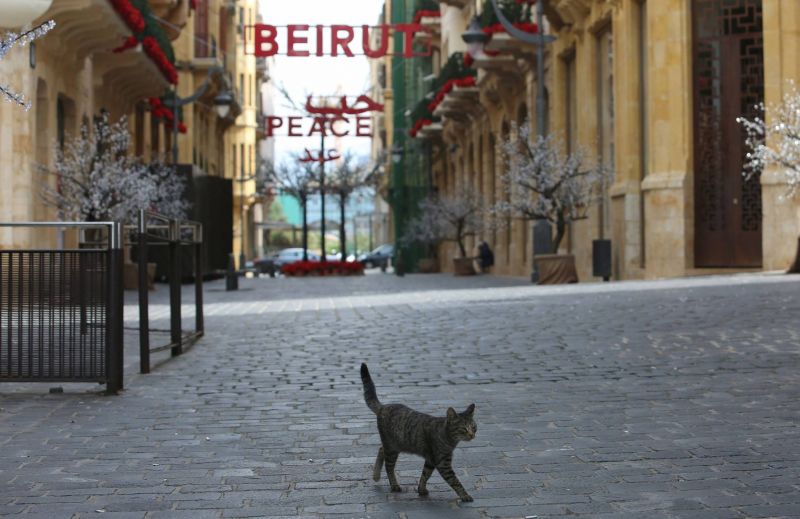
A cat walks on an empty street in downtown Beirut during Lebanon’s lockdown to curb the spread of COVID-19. (Credit: Aziz Taher/Reuters)
Want to get the Morning Brief by email? Click here to sign up.
With Lebanon’s COVID-19 lockdown currently set to end Monday, health experts warned against squandering gains from the shutdown while the situation is still critical. The Health Ministry registered 63 new deaths Monday, bringing the cumulative death toll to 3,145. ICU levels are hovering near critical levels with 960 patients requiring intensive treatment — an all-time high — while capacity is at 92.4 percent, according to the latest figures from the World Health Organization. “We are only just starting to see the benefits of lockdown,” one doctor told L’Orient Today, while another called for extending the restrictive measures.
A number of business lobbies urged against extending the lockdown, warning of its severe economic repercussions. The association of industrialists, which has had the majority of its factories shuttered, said that an extension would risk the loss of 50,000 manufacturing jobs. Food importers also sounded the alarm, dramatically warning that food stocks will halve in the coming weeks due to difficulties financing imports coupled with a reduction in their revenues during the lockdown. Meanwhile, the Beirut Traders Association predicted increased unemployment and shop closures if the lockdown is renewed.
The price of partially subsidized bread was hiked for the third time since the start of the financial meltdown. The caretaker economy minister announced that large bundles of bread will now cost LL2,500, up from LL2,250, but that the size will also increase from 900 grams to 930 grams — a 7.6 percent hike in the price per gram. Smaller bundles will cost LL1,750, up from LL1,500, and their size will increase from 400 grams to 450 grams — a 3.7 percent rise in the price per gram. The economy ministry cited the global increase in wheat prices and tumbling local currency as the reasons behind the move. The last price hike came just three weeks ago, days before authorities imposed the strict COVID-19 lockdown on the country.
The central bank’s usable reserves dropped by about $620 million in January, amid concerns over how long subsidies can last. On Jan. 8, Banque du Liban’s governor said that the central bank holds about $17.5 billion in foreign currency reserves, with estimates of required reserves hovering around $17 billion. Riad Salameh has repeatedly insisted on not dipping into these funds — a promise which, if kept, would mean the end to BDL’s subsidy programs in the coming weeks. Meanwhile, with the financial system paralyzed, demand for physical cash remains high despite central bank policies aimed to lower banknotes in circulation. BDL’s balance sheet shows an additional LL1.65 trillion in circulation outside BDL in January, putting the total over LL32.5 trillion.
Families of those killed in the Aug. 4 Beirut port explosion protested in front of the house of the lead investigator in the case. Dozens of demonstrators yesterday called on Judge Fadi Sawwan to expedite proceedings, nearly six months after the blast. With no one yet to be held accountable for the blast that killed over 200 people and injured thousands, the spokesperson for the families of the firefighters killed said Sawwan informed him that he will “resume his investigation” into the blast “immediately after the end of the countrywide lockdown.”
The speaker of Parliament indirectly blamed the president for the failure to form a government. Nabih Berri said he has proposed a solution to the impasse but that demands for a “blocking third” have stalled progress, in reference to Michel Aoun and his son-in-law Gebran Bassil’s reported demand for veto power. In response, Aoun’s office issued a statement denying the accusation, asserting that the president is merely “exercising his right to nominate competent and qualified ministers.” More than three months after Saad Hariri’s nomination as premier, he has been unable to come to an agreement with Aoun on the size and shape of a cabinet. Lebanon will have gone without a government for six months a week from tomorrow.